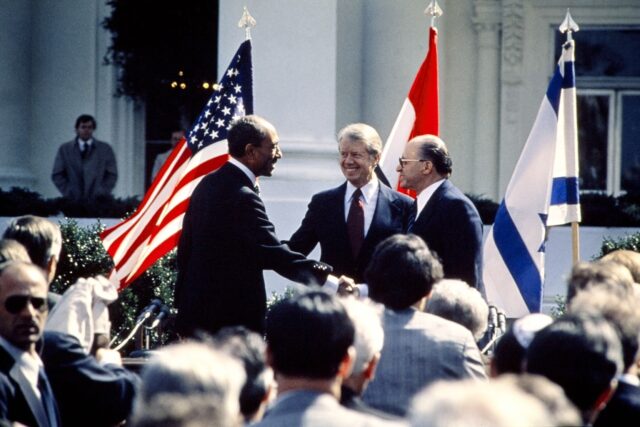US president Jimmy Carter, who died on Monday, left an enduring legacy when he brokered historic peace between Egypt and Israel — tepid and shaky, but unbroken even by the nearly 15-month long Gaza war.
“For 45 years we’ve had no war” with Egypt, said Ruth Wasserman Lande, a former Israeli diplomat in Cairo.
But, she told AFP, “I would not go as far as to say it’s a peace.”
Egypt and Israel have maintained close trade relations, security collaboration and diplomatic ties for nearly half a century since the agreement that made Cairo the first Arab government to recognise Israel.
The 1979 treaty saw Israel return the vast Sinai peninsula occupied in war years earlier, and Cairo become one of the top recipients of US military aid alongside neighbouring Israel.
But for ordinary Egyptians, Israel generally remains a public enemy.
Government officials in Cairo, for example, avoid clear references to Israel in economic briefings despite significant energy trade.
The devastating Israel-Hamas war in the Gaza Strip, which borders both countries, has reinvigorated Egyptians’ long history of solidarity with Palestinians.
And Israeli holidaymakers, who used to flock to Sinai, stopped in October 2023 when the war erupted with Hamas’s attack on Israel.
Some analysts accuse Israel of breaching the peace deal with its actions in Gaza.
Cairo University professor Mustapha Kamel al-Sayyid said the Israeli takeover of the Palestinian side of the Gaza-Egypt border in May was a “flagrant violation of the treaty”.
But still, the agreement has survived and analysts agree suspending it is not on the table for either government.
On Monday, both Egyptian President Abdel Fattah al-Sisi and Israel’s Prime Minister Benjamin Netanyahu paid tribute to Carter’s diplomatic legacy, which earned him a Nobel Peace Prize.
Mirror image
Carter made history when he hosted Egyptian president Anwar al-Sadat and Israeli Prime Minister Menachem Begin, beaming as they shook hands at the White House.
But even at the time, the reconciliation ruffled feathers and Sadat was accused of abandoning the Palestinian cause.
Egypt — the Arab world’s most populous country — was suspended from the Arab League for a decade, and Sadat was assassinated by Islamists in 1981, partly as a result of recognising Israel.
Forty-five years later, Carter himself is remembered differently on opposite sides of the border.
“In recent decades, Carter has primarily emerged in connection with his criticism of Israeli policy on Palestinian issues, leading significant portions of the Israeli public to view him as biased,” said Ofir Winter, senior researcher at the Institute for National Security Studies at Tel Aviv University.
The Nobel laureate had infuriated Israel by suggesting that its treatment of the Palestinians could constitute apartheid.
And in his 2006 book “Palestine: Peace Not Apartheid”, the former US president criticised Israel’s expanding settlements in the occupied West Bank.
For the same reasons, Sayyid said, Carter will be remembered as “the US president who proved the most fair to Arabs”.
‘No one wants a war’
No Israeli flags have flown over the embassy in Cairo since protesters stormed the diplomatic mission in the aftermath of the Egyptian uprising in 2011, angry over the deaths of Egyptian border guards.
When it reopened in 2015, the embassy operated out of the ambassador’s residence in the upscale Maadi district of southern Cairo.
Nearly a decade later, the Israeli government still lists no official Cairo address, but one corner of Maadi’s winding verdant streets has been blocked by a security cordon for years.
A seemingly apathetic policeman directs passersby to go around the block, and there is only one tiny sign in Hebrew peeking through the trees.
According to researcher Winter, Cairo has stalled on granting a new Israeli ambassador credentials, awaiting “a political climate that would allow the Egyptian president to receive him publicly”.
But public animosity is one thing, and Egypt’s national security interests are another.
In 1978, the Camp David Accords that preceded the peace agreement sealed Egypt’s exit from the Soviet Union’s sphere of influence and entry into the United States’, which it has never left.
And so Cairo has walked a diplomatic tightrope since the Gaza war began.
It has often accused Israel of committing war crimes, while seeking to maintain its role as mediator without rousing too much domestic ire or angering Israel’s closest allies in Washington.
When images of Israeli flags at the Gaza border stirred widespread anger in Egypt in May, Cairo’s foreign ministry only said potential treaty violations are handled “at a technical level”.
“Egypt holds fast to the peace treaty as a strategic choice,” said historian Tewfick Aclimandos of the Egyptian Center for Strategic Studies.
“It’s not out of love for Israel … but no one wants a war,” he told AFP.

COMMENTS
Please let us know if you're having issues with commenting.